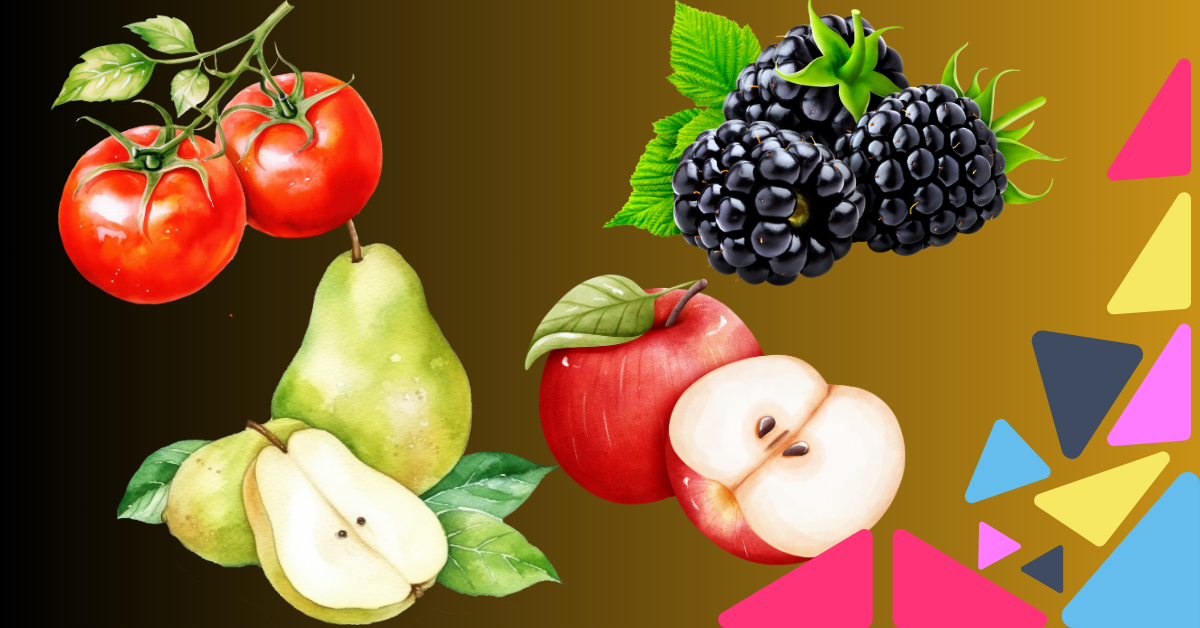If you’re a home gardener or someone interested in sustainable farming, growing kind seeds fruit is one of the best choices you can make. These fruits, grown from carefully selected seeds, offer numerous benefits ranging from nutritional value to environmental sustainability. Whether you’re planting them for personal use or to sell at your local farmer’s market, kind seeds fruit are a smart and healthy choice.
In this post, we will explore the top 5 reasons why you should grow kind seeds fruit and provide a step-by-step guide on how to plant, care for, and harvest them to get the best possible yield.
1. What Are Kind Seeds Fruit?
Kind seeds fruit refers to fruit that is grown from high-quality seeds known for their genetic purity, health benefits, and ability to thrive in various growing conditions. These seeds are often selected from plants that have a strong track record of producing robust, healthy fruit, ensuring that they can be easily grown both in home gardens and on larger farms.
The term “kind” emphasizes the quality and natural origins of the seeds, often referring to heirloom varieties or organic, non-GMO seeds. These fruits are prized not only for their taste but also for their nutritional content, making them a popular choice among health-conscious consumers and gardeners alike.
Some of the most common kinds of kind seeds fruit include apples, pears, tomatoes, and berries. They are typically easy to grow, even for beginners, and can provide a plentiful harvest when given the right care.
2. Top 5 Types of Kind Seeds Fruit You Can Grow
There are many different varieties of kind seeds fruit that you can grow, each offering its own unique benefits. Here are the top 5 types of kind seeds fruit that are easy to cultivate and offer excellent yields.
1. Tomatoes
- Tomatoes are one of the most popular fruits grown from kind seeds. They are versatile, easy to grow in most climates, and offer high nutritional value, rich in vitamins C and A. Whether you prefer cherry, heirloom, or Roma varieties, tomatoes are a staple in many gardens.
2. Strawberries
- Strawberries are a delicious and nutritious fruit that can be grown from kind seeds. These fruits are packed with antioxidants and are great for desserts, smoothies, or snacking. Strawberry plants are also relatively easy to care for and can be grown in small garden spaces or containers.
3. Apples
- Apple trees grown from kind seeds produce fruit that is rich in fiber and vitamins. There are numerous varieties of apples, including Gala, Granny Smith, and Fuji, all of which can be grown from kind seeds and adapted to different climates.
4. Blueberries
- Blueberries are a favorite among kind seeds fruit due to their health benefits and easy growth. These small, nutrient-rich berries are loaded with vitamin C, fiber, and antioxidants. They thrive in acidic soil and are perfect for small gardens or containers.
5. Pears
- Pears are another excellent option for those interested in growing kind seeds fruit. Like apples, they come in a variety of species, such as Bartlett and Anjou, and provide a good source of dietary fiber and essential vitamins.
These kind seeds fruit are not only delicious but also offer significant health benefits and are relatively easy to grow, even for beginners.
3. How to Grow Kind Seeds Fruit: A Step-by-Step Guide
Growing kind seeds fruit can be both a rewarding and fulfilling experience, especially when you follow the right steps to ensure a successful harvest. Here’s a simple guide to help you grow your own kind seeds fruit, whether you’re planting in your backyard or on a larger scale.
Step 1: Choosing the Right Seeds
Start by selecting high-quality kind seeds from a reputable supplier. Look for heirloom varieties or organic, non-GMO seeds to ensure that your plants will be healthy and productive. Make sure the seeds are well-suited to your local climate and soil conditions.
Step 2: Preparing the Soil
Kind seeds fruit thrive in well-draining, nutrient-rich soil. Prepare your garden bed by removing weeds, rocks, and debris. You can enhance the soil with organic compost or manure, which provides essential nutrients that will support strong root development.
Step 3: Planting the Seeds
Plant the kind seeds according to the specific needs of each variety. Generally, most seeds should be planted at a depth of 1/4 to 1/2 inch, with plenty of space between plants to allow for growth. Water the seeds gently after planting to keep the soil moist.
Step 4: Watering and Maintenance
Once the seeds have been planted, keep the soil consistently moist but not waterlogged. Water the plants in the early morning or late evening to prevent evaporation and avoid overwatering, which can cause root rot. Mulching around the plants can help retain moisture and reduce weeds.
Step 5: Fertilizing
Use a balanced organic fertilizer to promote growth. Most kind seeds fruit benefit from fertilization every 4-6 weeks during the growing season. Be sure to follow the specific instructions for each fruit variety.
Step 6: Pest Control
To keep pests at bay, practice natural pest control methods, such as introducing beneficial insects (like ladybugs) and using organic pesticides when necessary. Avoid harsh chemicals that can harm your plants and the environment.
By following these steps, you can cultivate a thriving garden of kind seeds fruit that will yield delicious and nutritious harvests.
4. The Health Benefits of Eating Kind Seeds Fruit
Kind seeds fruit are not only delicious but also packed with vital nutrients that can boost your overall health. Here are some key health benefits of including kind seeds fruit in your diet:
1. Rich in Vitamins and Minerals
Kind seeds fruit, like apples, berries, and tomatoes, are loaded with vitamins C, A, and K, along with important minerals like potassium and magnesium. These nutrients support immune function, skin health, and cardiovascular wellness.
2. High in Antioxidants
Fruits grown from kind seeds, especially berries and tomatoes, are known for their high levels of antioxidants, which help protect the body from oxidative stress and reduce the risk of chronic diseases like heart disease and cancer.
3. Good Source of Fiber
Most kind seeds fruit are excellent sources of dietary fiber, which aids in digestion, helps regulate blood sugar levels, and supports heart health by reducing cholesterol.
4. Low in Calories
For those looking to maintain a healthy weight, many kind seeds fruit are naturally low in calories and make for an excellent addition to any balanced diet. Fruits like strawberries, blueberries, and apples can help satisfy cravings without excessive calorie intake.
5. Hydration
Many kind seeds fruit have a high water content, which contributes to overall hydration and helps maintain healthy skin and energy levels.
By incorporating more kind seeds fruit into your diet, you can enjoy a variety of health benefits while also savoring their fresh, delicious taste.
5. Organic Kind Seeds Fruit: Why You Should Consider Growing Them
Growing organic kind seeds fruit is a great way to ensure that the produce you harvest is free from harmful chemicals and pesticides. Organic gardening not only promotes better health but also helps protect the environment. Here’s why you should consider growing organic kind seeds fruit:
1. Healthier for You
Organic kind seeds fruit are grown without the use of synthetic pesticides or fertilizers, making them a healthier choice for you and your family. Organic fruits contain fewer pesticide residues and are often richer in nutrients.
2. Better for the Environment
By growing organic fruit, you contribute to the reduction of chemical pollution in the soil and water. Organic farming practices also promote biodiversity by supporting the growth of beneficial insects and other wildlife in your garden.
3. Supports Soil Health
Organic gardening enhances soil quality by adding natural compost and encouraging the growth of beneficial microorganisms. Healthy soil leads to stronger plants that are more resistant to diseases and pests.
4. Safer for Pollinators
Many pesticides used in conventional farming can harm bees and other pollinators. Organic farming protects these crucial species, which are essential for the pollination of many fruit plants.
5. Higher Quality Produce
Fruits grown organically often taste better and have a more vibrant color and texture. By growing organic kind seeds fruit, you’ll enjoy produce that is fresher and more flavorful than store-bought options.
Choosing to grow organic kind seeds fruit is an investment in both your health and the health of the planet.
6. Harvesting Kind Seeds Fruit: Tips for Getting the Best Yield
Harvesting kind seeds fruit at the right time is key to ensuring the best flavor and quality. Here are some tips to help you get the maximum yield from your fruit plants:
1. Timing Is Key
Each type of kind seeds fruit has its own optimal harvest time. For example, tomatoes should be picked when they are fully colored but still firm, while apples can be harvested when they easily come off the tree with a gentle twist.
2. Watch for Ripeness
Pay close attention to the ripeness of your fruit. Ripe fruit will often have a vibrant color, a pleasant aroma, and will feel slightly soft to the touch. Harvesting too early can result in less flavorful fruit, while waiting too long may cause the fruit to spoil.
3. Use the Right Tools
When harvesting, use clean, sharp pruning shears to avoid damaging the plant. Gently clip the fruit off the vine or branch, leaving a small portion of the stem attached to the fruit to prolong its freshness.
4. Store Properly
After harvesting, store your kind seeds fruit in a cool, dry place. Fruits like tomatoes should be kept at room temperature until fully ripened, while berries can be refrigerated to extend their shelf life.
5. Continuous Harvesting
For many kinds of kind seeds fruit, regular harvesting encourages the plant to produce more fruit. Be sure to check your plants frequently and pick ripe fruit to ensure you get the best yield.
By following these harvesting tips, you can enjoy a bountiful supply of kind seeds fruit throughout the growing season.
For more exciting blogs, visit our homepage Magzineco.
Conclusion: Why Kind Seeds Fruit Is a Smart Choice for Gardeners and Farmers
Growing kind seeds fruit is a smart choice for anyone interested in enjoying nutritious, delicious, and environmentally friendly produce. With so many varieties to choose from, including tomatoes, apples, and berries, kind seeds fruit offers numerous health benefits and is easy to grow in a variety of climates.
Whether you’re a home gardener or a small-scale farmer, investing in kind seeds fruit is a rewarding way to enjoy fresh, organic fruit while contributing to a healthier planet. By following the tips in this guide, you can successfully grow and harvest your own kind seeds fruit and enjoy the many benefits it has to offer.
FAQs About Kind Seeds Fruit
- What is kind seeds fruit?
- Kind seeds fruit refers to fruit grown from high-quality seeds, often organic or heirloom varieties, that are known for their genetic purity and strong yields.
- What are the best types of kind seeds fruit to grow?
- Some of the best types of kind seeds fruit include tomatoes, strawberries, apples, blueberries, and pears.
- How do you grow kind seeds fruit?
- To grow kind seeds fruit, plant the seeds in well-draining soil, water regularly, provide plenty of sunlight, and use organic fertilizers to encourage healthy growth.
- What are the health benefits of kind seeds fruit?
- Kind seeds fruit is rich in vitamins, antioxidants, and fiber, supporting immune health, digestion, and overall wellness.
- Is kind seeds fruit easy to grow?
- Yes, most kinds of kind seeds fruit are easy to grow, even for beginners, with proper care and attention to soil, water, and sunlight.
- Can I grow kind seeds fruit organically?
- Absolutely! Growing kind seeds fruit organically ensures that your fruit is free from harmful chemicals and pesticides.
- When is the best time to harvest kind seeds fruit?
- The best time to harvest kind seeds fruit depends on the specific variety, but you should look for signs of ripeness such as vibrant color and a firm but slightly soft texture.
- What soil is best for growing kind seeds fruit?
- Kind seeds fruit thrives in well-draining, nutrient-rich soil with plenty of organic matter like compost or manure.
- Are kind seeds fruit good for small gardens?
- Yes, many kinds of kind seeds fruit can be grown in small gardens or even containers, making them ideal for limited spaces.
- Why should I choose organic kind seeds fruit?
- Organic kind seeds fruit is better for your health, the environment, and supports biodiversity by reducing chemical use.




